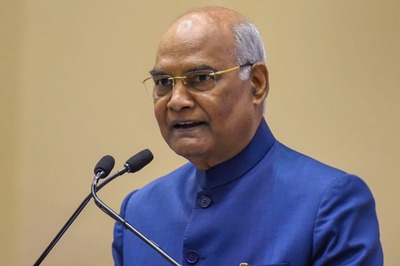
views
New Delhi: The Tamil Nadu government has decided to move the Supreme Court against the approval given by the Central Water Commission (CWC) to build a project at Mekedatu, across the river Cauvery.
The centuries-long dispute over the waters of river Cauvery was settled with the Cauvery Water Management Authority being set up. This new dispute – underlined by the state government’s efforts to obtain a stay from the Supreme Court and DMK chief MK Stalin looking to rally support from the opposition parties – is likely to be the key ahead of the 2019 Lok Sabha polls.
Before the CWC gave the nod, it was a meeting between Prime Minister Narendra Modi and Karnataka chief minister HD Kumaraswamy that had Tamil Nadu up in arms. What is the Mekedatu project?
‘Mekedatu’, literally ‘Goat’s leap’ in Kanna, is at the confluence of Cauvery and Arkavathi rivers, near Kanakapura which is at a distance of 110 km from Bengaluru. In 2013, the project was announced by the-then Karnataka law minister TB Jayachandra.
A multi-purpose balancing reservoir project over Mekedatu, built at a cost of Rs 5,912, was aimed at solving the drinking water problems of Bengaluru and Ramnagar district. This project was also touted as one that could generate hydroelectricity to meet the power demand in the state.
As per Karnataka water resources minister, DK Shivakumar, the proposed project intends to store excess water that would otherwise flow into the Bay of Bengal. Between 250 MW to 400 MW of electricity is also expected to be produced, he said, while adding that the reservoir would store up 66 TMC feet of water.Why does it matter to Bengaluru?
Affluence and development has arrived in the city, hand-in-hand with uncontrolled urbanization. The result: global lists of cities likely to run out of water includes Bengaluru. Last month, deputy chief minister G Parameshwara admitted that the situation was dire and warned of imminent water crisis.
An analysis by the Centre for Science and Environment (CSE) found that the total number of extraction wells in the city had shot up from 5,000 to 0.45 million in the past 30 years. Consequently, recharge of ground water is minimal and the city only uses half of its treatment capacity for water, the report found.
As per the plan, Bengaluru and other areas would get 16.10 TMC of potable water and experts believe that it would be able to help the city address its water woes.
Why does Tamil Nadu object?
The Tamil Nadu government’s plea before the Supreme Court makes their stand clear. It asked the apex court to “restrain the State of Karnataka from proceeding with the construction of two reservoirs at Mekedatu across river Cauvery…or any other new projects across the river Cauvery in Karnataka which are not contemplated and/or permitted in the final decision of the Tribunal,” it states.
While asking for Karnataka to maintain the status quo, it reiterated the objections that Tamil Nadu chief minister E Palaniswami sent to Modi. The state contended that “the proposed reservoir would affect the natural flows of the river Cauvery and nullifies the final adjudication” of the settlement of the centuries-long Cauvery river dispute through the formation of the Cauvery Water Regulation Committee.
It argued that Cauvery was already a deficit basin and the construction of the project, or any other project “would drastically affect the lower riparian State in getting their due share of waters as per the Final Order of the Tribunal as modified by this Hon’ble Court”.
The Tamil Nadu government also alleged that the CWC “ought to have advised Karnataka to get the concurrence of Tamil Nadu and other co-basin States” and claimed that no action had been taken by the-then supervisory committee on the basis of complaints it filed against Karnataka’s "unauthorized lift irrigation schemes".
Karnataka has maintained that the extra drawing of water will not, in any way, affect the mandatory allocation of water to Tamil Nadu and Puducherry.What next?
A legal battle seems inevitable.
But with elections around the corner, the issue is also likely to become the nub of a heated political battle between the two states and battle lines are already being drawn.
While the state government has taken a legal course in Tamil Nadu, the opposition DMK will be protesting at Tiruchy on December 4, and has sought the support of other parties to support it. It has also put the pressure on the Tamil Nadu government, asking for a special session of the Assembly.
Back in Karnataka, the Kumaraswamy government is keen to implement the big budget project that it had announced earlier, while state BJP president BS Yeddyurappa was quick to credit the BJP-led Centre. In a statement, he maintained the project should be treated as key, since it would address the drinking water shortage in Bengaluru and Kolar districts.




















Comments
0 comment